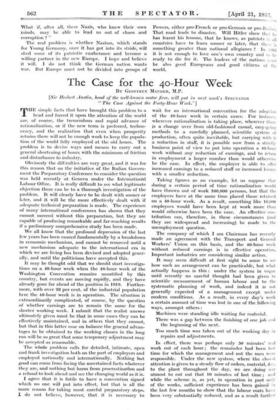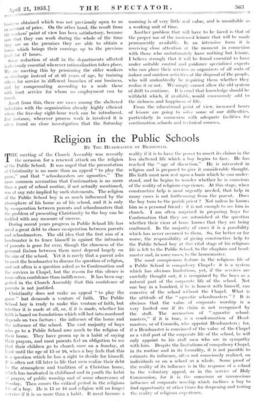The Case for the 4.0-Hour Week
BY GEOFFREY MANDER, M.P.
[Sir Herbert Austin, head of the well-known motor firm, will put in next week's SPECTATOR " The Case Against the Forty-Hour Week."] THE simple facts that have brought this problem to a head and forced it upon the attention of the world are, of course, the tremendous and rapid advance of rationalization, or if the new term is preferred, techno- cracy, and the realization that even when prosperity returns there will not be enough work to keep the popula- tion of the world fully employed at the old hours. The problem is to devise ways and means to carry out a general shortening of hours with the minimum of friction and disturbance to industry.
Obviously the difficulties are very great, and it was for this reason that on the initiative of the Italian Govern- ment the Preparatory Conference to consider the question was held recently at Geneva under the International Labour Office. It is really difficult to see what legitimate objection there can be to a thorough investigation of the problem. It will clearly have to be dealt with sooner or later, and it will be the more effectively dealt with if adequate technical preparation is made. The experience of many international conferences has shown that they cannot succeed without this preparation, but they are capable of producing remarkable and far-reaching results if a preliminary comprehensive study has been made.
We all know that the profound depression of the last few years has been caused fundamentally by a breakdown in economic mechanism, and cannot be removed until a new mechanism adequate to the international era in which we are living has been devised and adopted gener- ally, and until the politicians have accepted this.
It may be thought odd that we should start investiga- tions on a 40-hour week when the 48-hour week of the Washington Convention remains unratified by this country, but events are moving rapidly, and they have already gone far ahead of the position in 1919. Further- more, with over 93 per cent. of the industrial population here the 48-hour week is in operation. The situation is extraordinarily complicated, of course, by the question of whether earnings are to remain the same for the shorter working week. I submit that the realist answer ultimately given must be that in some cases they can be effectively maintained, and in others that they cannot, but that in this latter case on balance the general advan- tages to be obtained to the working classes in the long run will be so great that some temporary adjustment may be accepted as reasonable.
The whole problem calls for detailed, intimate, open and frank investigation both on the part of employers and employed nationally and internationally. Nothing but good can come from facing the ascertained facts whatever they are, and nothing but harm from procrastination and a refusal to look ahead and see the changing world as it is.
I agree that it is futile to have a convention signed which no one will put into effect, but that is all the more reason for taking most careful preparatory. steps I do not believe, however, that it is necessary to wait for an international convention for the adoption of the 40-hour week in certain cases. For instance, wherever rationalization is taking place, wherever there is a change over from old-fashioned casual, easy-going methods to a carefully planned, scientific system of production, often quite inevitable, but carrying with it a reduction in staff, it is possible now from a strictly business point of view to put into operation a 40-hour week without any reduction of earnings, and to retain in employment a larger number than would otherwise be the case. In effect, • the employer is " able to offer increased earnings to a reduced staff or increased leisure with a smaller reduction.
Taking figures as an example, let us suppose that during a certain period of time rationalization would have thrown out of work 100,000 persons, but that the employers have at the same time placed those retained on a 40-hour week. As a result, something like 16,000 employees would have been kept at work more than would otherwise have been the case. An effective con- tribution can, therefore, in these circumstances (and they are widespread and increasing) be made to the unemployment question.
The company of which I- am Chairman has recently made an agreement with the Transport and General. Workers' Union on this basis, and the 40-hour week without reduced earnings is in effective operation. Important industries are considering similar action.
It may seem difficult at first sight to some to see how such an arrangement can be practicable, but what actually happens is this : under the system in vogue until recently no careful thought had been given to scientific measurement of human labour and to the systematic planning of work, and indeed it is not generally expected of a management except under modern conditions. As a result, in every day's work a certain amount of time was lost in one of the-following ways, amongst others : Machines were standing idle Waiting for -Material. There was a gap between the finishing of one job and the beginning of the next.
Too much time was taken out of the working day in repairs and adjustments.
In effect, there was perhaps only 50 minutes' real work out of each hour ; the remainder had been lost time for which the management and not the men were responsible. Under the new system, where the closest attention is given to a steady flow of orders, material, &e., to the plant throughout the day, we are doing our utmost to cut out that 10 minutes of lost time ; and while the scheme is, as yet, in operation in part only of the works, sufficient experience has been gained in the last few months to show-that the labour costa have been very substantially reduced, and as a result further. lahiness obtained which was not previously open to us on ztecount of price. On the other hand, the 'result from the workers' point of view has been satisfactory, because limy that they can work during the whole -of the time they are on the premises they are able to obtain a bonus which brings their earnings up to the previous level for 47 hours.
Some reduction of staff in the departments affected is obviously essential wherever rationalization takes place. We are meeting this by pensioning the older workers on discharge instead of at 65 years of age, by training others for service indifferent .branches of our business, and by compensating according to a scale those with least service for whom no employment can be found.
Apart from this, there arc cases among the sheltered industries with the organization already highly efficient where the five-day eight-hour week can be introduced. For instance, wherever process work is involved it is often found on close investigation that the Saturday morning is of very little real value, and is unsuitable as a working unit of time.
Another problem that will have to be faced- is that of the proper use of the increased leisure that will be made permanently available. In an intensive form it is receiving close attention at the moment in connexion with those who unfortunately have nothing but leisure. I believe strongly that it will be found essential to have under suitable control and guidance specialized experts who can place their services as organizers of all sorts of indoor and outdoor activities at the disposal of the people, who will undoubtedly be requiring them whether they realize it or not. We simply cannot allow the old system of drift to continue. It is cruel that knowledge should be withheld which, if available, would enormously add to the richness and happiness of life.
From the educational point of view, increased hours of leisure are going to solve some of our difficulties, particularly in connexion with adequate facilities for continuation schools and technical courses.







































 Previous page
Previous page